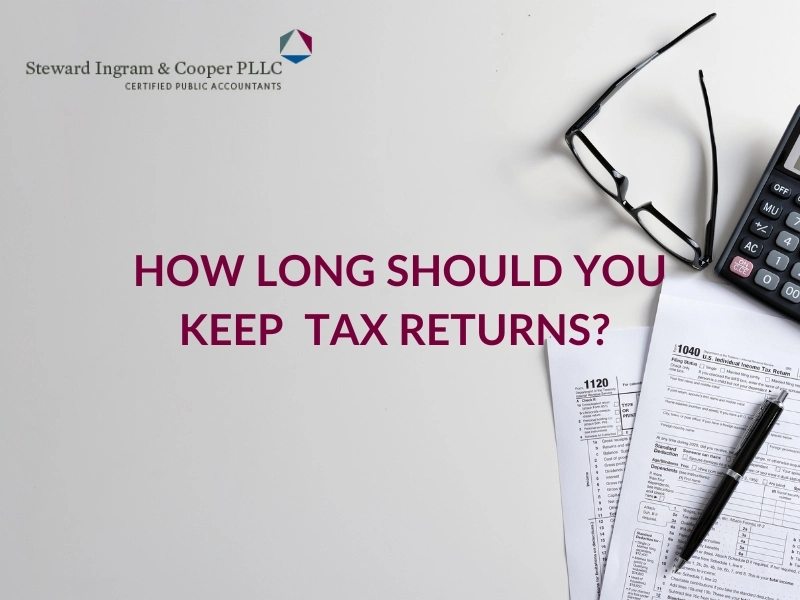It’s important to keep your tax records in case you are audited. What is the general rule of thumb when keeping tax records? And, how long should you keep tax returns? How long to keep tax returns depends on the type of tax record you have. The simple answer is to use the statute of limitations on IRA audits as a key factor in deciding how long to keep tax records. But, according to the IRS, there are varying statutes of limitations, depending on the record.
In this article, we will answer the question of the length of time you should keep tax records in more detail.
How Long to Keep Tax Returns
As mentioned above, how long to keep tax returns and other documents is based on the period of limitation. This phrase, “period of limitation,” means the time in which action can be taken. Typically, you have a certain time to amend your return to claim a credit, or the IRS can take action against you.
Keeping the tax return and the documents you used to complete the return is crucial if you are ever audited. By law, the IRS can assess tax within three years after your return was due, including extensions; or, if you filed late, within three years after they receive your return, whichever is later. (This time period is called the Assessment Statute Expiration Date, or ASED.) Diligent recordkeeping can also help if you need to file an amended return due to finding a mistake or when you learn of a tax break you should have claimed.
As per the IRS, how long to keep tax returns is largely based on the following situations. Use the information below to keep tax records based on your situation.
Three Years
Keep records for three years from the date you filed your original return or two years from the date you paid the tax, whichever is later if you file a claim for credit or refund after you file the return. Keep records for three years if you don’t have cause to keep them longer. As a general rule, straightforward personal tax returns should be kept for 3 years.
Six Years
Keep records for six years if you do not report income that you should report, and it is more than 25% of the gross income shown on your return.
Seven Years
Keep records for seven years if you file a claim for a loss from worthless securities or bad debt deduction.
Indefinitely
- Keep records indefinitely if you do not file a return.
- Keep records indefinitely if you file a fraudulent return.
- Keep employment tax records for at least 4 years after the date that the tax becomes due or is paid, whichever is later.
How Long Should You Keep Business Tax Returns?
When addressing how long to keep tax returns for businesses, the same applies — keep business tax returns and records for the same period addressed above for individual returns. The IRS generally suggests keeping records for three years. However, it may be cumbersome and impractical to keep different documents for different lengths of time. If so, a general guide can be to keep tax returns and other records for seven years, starting from the later of the filing date and due date of the related tax return.
How Long to Keep Business Receipts
According to the IRS, how long you, as a business owner, should keep a document depends on several factors, including:
- The action
- Expense
- Event recorded in the document
Generally, you should keep business receipts for as long as the IRS can audit your records–usually, for three years. Keeping your business receipts for at least three years allows you the ability to show proof of purchases or sales if necessary.
Keeping Records and Supporting Tax Documentation
The IRS may be able to ask you for supporting documentation for three to seven years after you file a return. Based on this, save for three to seven years any document that verified information on your tax return, including:
- Forms W-2 and 1099
- Bank and brokerage statements
- Tuition payments
- Charitable donation receipts
As a small business owner, you can choose any recordkeeping system that fits your business. Choose a system that clearly shows income and expenses. Keeping good records as a business owner helps you in several ways:
- Monitor the progress of your business
- Prepare financial statements
- Identify income sources
- Keep track of expenses
- Prepare tax returns and support items reported on tax returns
Should You Keep Business Tax Records Forever?
As a business owner, you must keep certain tax records indefinitely. Assets usually have tax consequences upon sale, so it’s important to keep records relating to the asset until the statute of limitation expires for the year in which the sale happened.
Company formation documents and ownership records such as stock ledgers, titles, deeds, property records, contracts, bylaws, and meeting minutes should be retained permanently. Failure to maintain corporate records could cause the corporation’s owners to lose liability protection.
Missing information and documentation can cause substantial liability. Knowing how long to keep tax returns and other records for the appropriate period enables your business to respond to requests such as tax audits.
Schedule a Tax Consultation with a Raleigh CPA
If you need assistance staying on top of your financial records or further clarification on how long to keep tax returns, turn to Steward Ingram & Cooper, PLLC. Our team of CPAs provides auditing and financial statement preparation to business owners in Raleigh, Durham, and surrounding areas. Call us today at (919) 872-0866 or fill out our form below to inquire about our services.

